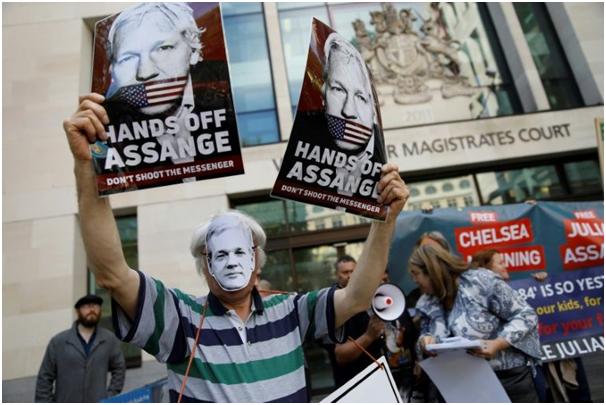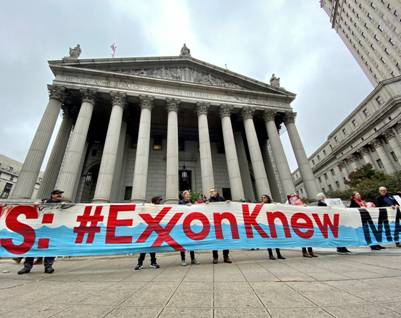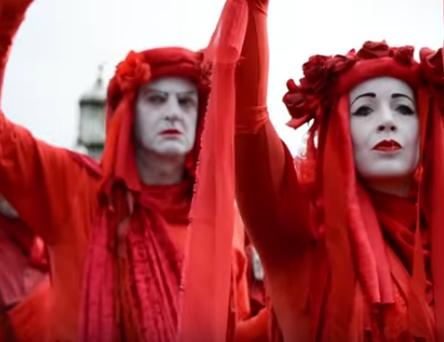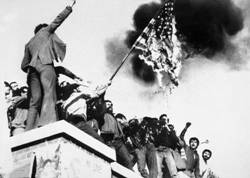Bulletin N° 866
“Hearts
of the World”
A 1918 American silent
World War I propaganda film written, produced and directed by D. W. Griffith,
whose stature and reputation for
dramatic filmmaking attracted the British government to contact him in an
effort to change the American public's neutral stance regarding the war.
Subject
:
The Capitalist Conspiracy, Part 3: The Topology of Crisis Formations for
Guaranteed Capitalist Investments & The Flourishing “Anti-Terrorist”
Market.
November
10, 2019
Grenoble,
France
Dear
Colleagues and Friends of CEIMSA,
Puppeteers
and ventriloquists have an advantage over the rest of us in that they are
masters of illusion. The culture heroes of capitalism gain from this advantage,
as well. And under the spell of their hegemony, we, the ordinary people, are
doomed to repeat and play out the script that has been handed to us by the
masters.
·
How do we gain control over our lives in
this context?
·
By changing the context, of course!
Many
years ago, I received an email from the late peace activist William Blum in
which he included a short essay by Finnish journalist Per Fagereng,
describing the conditions of a behavioral study that had been conducted on a
colony of caged rats and commenting on the ethical implications of this
laboratory experiment.
Dancing on the electric grid
by Per Fagereng
[Please see CEIMSA Bulletin N°472 @ http://www.ceimsa.org/archives/bull-472.html]
This
essay illustrates the casual denial of the essential influence of specific context in developing human
comprehension; even in the quest for scientific knowledge context is frequently ignored as an important factor that must
contribute to our understanding. The result is cognitive dissonance: We
get what we see, and it is usually a terrible distortion, often leading to
unproductive interventions and illusions rather than productive knowledge.
Such
is the subtext of the autobiography of German journalist Raimund
Pretzel (1907-1999), whose nom de plume
was Sebastian Haffner, author of Geschichte
eines Deutschen. He
began to write this book in 1939, while in exile in England, and it was
published posthumously in 2000. The English edition, translated by his son,
Oliver Pretzel, was first published in 2002, under the title, Defying
Hitler: A Memoir [1914-1933].
Writing
from abroad in 1939, Haffner begins the Prologue for
his autobiography with a clear statement orienting the reader for what is to
follow:
This is the story of a duel.
It is a duel between two very unequal
adversaries: an exceedingly powerful, formidable and ruthless state and an
insignificant, unknown private individual. The duel does not take place in what
is commonly known as the sphere of politics; the individual is by no means a
politician, still less a conspirator, or an enemy of the state. Throughout, he
finds himself very much on the defensive. He only wishes to preserve what he
considers his integrity, his private life and his personal honour.
These are under constant attack by the Government of the country he live in,
and by the most brutal, but often also clumsy, means.
With fearful menace the state demands that
the individual give up his friends, abandon his lovers, renounce his beliefs
and assume new, prescribed ones. He must use a new form of greeting, eat and
drink in ways he does not fancy, employ his leisure in occupations he abhors,
make himself available for activities he despises, and
deny his past and his individuality. For all this, he must constantly express
extreme enthusiasm and gratitude.
The individual is opposed to all of that,
but he is ill prepared for the onslaught. He was not born a hero, still less a martyr.
He is just an ordinary man with many weaknesses, having grown up in vulnerable
times. He is nevertheless stubbornly antagonistic. So he enters into the duel –
without enthusiasm, shrugging his shoulders but with a quiet determination not
to yield. He is, of course, much weaker than his opponent, but rather more
agile. You will see him duck and weave, dodge his foe and dart back, evading
crushing blows by a whisker.
. . .
The
state is the German Third Reich and I am the individual. Our fight may be
interesting to watch, like any fight . . . , but I am not recounting it just
for entertainment. There is another purpose, closer to my heart.
My private duel with the Third Reich is
not an isolated encounter. Thousands, maybe hundreds of thousands of such
duels, in which an individual tries to defend his integrity and his personal honour against a formidable hostile state, have been fought
in Germany during the last six years. Each is waged in total isolation and out
of public view. Many of the duelists, greater heroes or martyrs by nature, have
taken the fight further than I – as far as the concentration camp or the
gallows – and may perhaps be honoured by a future
monument. Others were defeated much earlier and are now silent grumblers in the
ranks of SA reservists or NSV Blackwarts
(block wardens).(pp.3-4)
Haffner
was born into a comfortable middle-class household. His father was a civil
servant in the prestigious Prussian state apparatus. He was educated to follow in his father's
footsteps; then the bottom fell out during events in Berlin that led up to the
Nazi seizure of power and his life became unsettled; he was facing challenges
which his father had never been forced to confront. Somehow, the family held together, which
allowed him to escape this inferno shortly before war broke out. He begins the
description of his odyssey this way:
Even before the totalitarian state
advanced on me with threats and challenges, and taught me what it meant to
experience history in person, I had already lived through a fair number of
‘historical events’. All Europeans of the present generation can make that
claim, and no one more so than the Germans.
Those events have naturally left their
mark on me, as on all my compatriots. If one fails to appreciate this, one will
not be able to understand what happened later. There is, however, an important
difference between what happened before 1933 and what came afterwards. We
watched the earlier events unfold. They occupied and excited us, sometimes they
even killed one or other of us or ruined him; but they did not confront us with
ultimate decisions of conscience. Our innermost being
remained untouched. We gained experience, acquired convections, but
remained basically the same people. However, no one who has, willingly or reluctantly,
been caught up in the machine of the Third Reich can honestly say that of
himself.
Clearly historical events have varying
degrees of intensity. Some may almost fail to impinge on true reality, that is,
on the central, most personal part of a person’s life. Others can wreak such
havoc there that nothing is left standing. The usual
way in which history is written fails to reveal this. ‘1890: Wilhelm II
dismissed Bismarck.’ Certainly a key event in German history, but scarcely an
event at all in the biography of any German outside its small circle of
protagonists. Life went on as before. No family was torn apart, no friendship
broke up, no one fled their country. Not even a
rendezvous was missed or an opera performance cancelled. Those in love, whether
happily or not, remained so; the poor remained poor, and the rich rich. Now compare that with ‘1933: Hindenburg send for
Hitler.’ An earthquake shatters sixty-six million lives.
Official academic history has, as I said,
nothing to tell us about the differences in intensity of historical
occurrences. To learn about that, you must read biographies,
not those of statesmen but the all too rare one of unknown individuals.
There you will see that one historical event passes over the private (real)
lives of people like a cloud over a lake. Nothing stirs,
there is only a fleeting shadow. Another event ships up the lake as if in a
thunderstorm. For a while it is scarcely recognizable. A third may, perhaps,
drain t(he lake completely.
I believe history is misunderstood if this
aspect is forgotten (and it usually is forgotten). So before I reach my proper
theme, let me tell you my version of twenty years of German history – the
history of Germany as a part of my private story. It will not take long, and it
will make what follows easier to understand. (pp.6-7)
Haffner
was seven years old when World War I started. His descriptions of the war
years reflect the behavior of a precocious young student who was thoroughly
indoctrinated by military propaganda. He memorized the names and statistics of
famous military victories as they were posted daily in front of Berlin police
stations. This child had every reason to believe that “his team” was winning
the contest, and he was proud to belong to the winning side. When defeat became
apparent - first to the housewives, then to the children – the military
propaganda lost its magic. There was confusion and disappointment, which
according to Haffner lead in two directions: some,
like Hitler, sought an explanation for the German defeat in the idea of
"betrayal", the enemy within;
while others were struck with how easy it was to create a virtual reality and
to convince the population with words that victory was at hand and that they all
were heading for a better life. The former group committed themselves to
entering politics for "revenge", so that the enemy within could be exposed and
driven from their midst in preparation for the next war. The latter adopted the
habit of skeptical thinking, not to be emotionally manipulated by words and
symbols which were produced to secure power in the hands of a few over society.
When
the hyperinflation hit Germany in 1923, Haffner was
fifteen years old. He experienced the sudden inequality when some youth in his
social milieu, who were but a few years older than him, came into unexpected wealth;
the rest of the population reeled in abject poverty.
There was nothing really new in the
devaluation of the mark. Even in 1920, the first cigarette I had secretly
smoked had already cost fifty pfennigs. By the end of 1922, prices had
gradually risen to between ten and a hundred times the pre-war peacetime level, and the dollar stood at about five hundred marks.
This, however, had happened gradually. Wages, salaries, and prices in general
had risen at the same pace. It was a bit inconvenient to work with the large
numbers, but not overly difficult. Many people still spoke of it as a ‘rise in
prices’. There were more exciting things to think about.
But the mark now went on the rampage. Soon
after the beginning of the ‘Ruhr war’ [early rebellion against the French and
Belgian military invasion of the industrial Ruhr River Valley that began in
1923; the military occupation ended 1925], the dollar shot to 20,000 marks,
rested there for a time, jumped to 40,000, paused again and then, with small
periodic fluctuations, coursed through the ten thousands and then the hundred thousands. No one quite knew how it happened. Rubbing our
eyes, we followed its progress like some astonishing natural phenomenon. It
became the topic of the day. Then, suddenly, looking around, we discovered that
this phenomenon had devastated the fabric of our daily lives.
Anyone who had savings
in a bank, bonds or ‘gilts’ [low-risk government bonds], saw their value disappear
overnight. Soon it did not matter whether it was a penny put away for a
rainy day or a vast fortune. Everything was obliterated. Many people quickly
moved their investments only to find that it made no difference. Very soon it
became clear that something had happened that forced everyone to forget about
their savings and attend to a far more urgent matter.
The cost of living had begun to spiral out
of control. Traders followed hard on the heels of the dollar. A pound of
potatoes which yesterday had cost fifty thousad marks
now cost a hundred thousand. The salary of sixty-five thousand marks brought
home the previous Friday was no longer sufficient to
buy a packet of cigarettes on Tuesday.
What was to be done? Casting around,
people found a life-raft: ‘shares’. They were the only form of investment which
kept pace – not all the time, and not all shares, yet on the whole they managed
to keep up. So everyone dealt in shares. Every minor official, every employee,
every shift-worker became a shareholder. Day-to-day purchases were paid for by
selling shares. On wage days there was a general stampede to the banks, and
share prices shot up like rockets. The banks were bloated with wealth. Obscure
new ones sprouted up like mushrooms and did a roaring trade. Every day the
entire population studied the stock-market listings. Sometimes some shares
collapsed and thousands of people hurtled towards the abyss. In every shop,
every factory, every school, share tips were whispered in one’s ear.
The old and unworldly had the worst of it.
Many were driven to begging, many to suicide. The young and quick-witted did
well. Overnight they became free, rich and independent. It was a situation in
which mental inertia and reliance on past experience was punished by starvation
and death, but rapid appraisal of new situations and speed of reaction was
rewarded with sudden, vast riches. The twenty-one-year-old bank director
appeared on the scene, and also the ‘sixth-former’ [the student in Britain
between 16 and 18 years old, in his final two years of school, before entering
the university] who earned his living from the stock-market tips of his
slightly older friends. He wore Oscar Wilde ties, organized champagne parties,
and supported his embarrassed father.
Amid all the misery, despair and poverty
there was an air of light-headed youthfulness, licentiousness and a carnival
atmosphere. No, for once, the young had money and the old did not. Moreover,
its nature had changed. Its value lasted only a few hours. It was spent as
never before or since; and not on the things old people spend their money on.
Bars and nightclubs opened in large
numbers. Young couples whirled about the streets of the amusement quarters. It
was like a Hollywood movie. Everyone was hectically, feverishly searching for
love and seizing it without a second thought. Indeed, even love had assumed an
inflationary character.
Unromantic love was the fashion: carefree,
restless, light-hearted promiscuity. Typically, love affairs followed an
extremely rapid course, without detours. The young who learned to love in those
years eschewed romance and embraced cynicism. I myself and those of my age were
not among them. At fifteen or sixteen we were a few years too young. In later
years when we had to entertain our girlfriends with twenty-odd marks’ pocket
money, we often secretly envied the older boys who had had their chance at this
time. We only caught a glimpse through the keyhole, just enough to preserve a
whiff of the perfume of the time forever in our nostrils. To us, it was
thrilling to be taken by chance to a wild party; to experience a precocious,
exhausting abandon and a slight hangover next day form too many cocktails; to
listen to the older boys with their worn faces showing the traces of their
dissolute nights; to experience the sudden transporting kiss of a girl in
daring makeup . . .
There was another side to this picture.
There were beggars everywhere and many reports of suicides in the papers. The
poster columns were full of police ‘Wanted’ notices for burglars. Robbery and
burglary occurred on a grand scale. Once I saw an old woman – perhaps I should
say an old lady – seated on a bench in a park looking strangely blank and
stiff. A little crowed gathered round her. ‘Dead,’ said someone. ‘Of
starvation,’ said another. It did not surprise me particularly. At home, we
also often went hungry.
Indeed, my father was one of those who did
not, or did not wish to, understand the times, just as he had already refused
to understand the war. He entrenched himself behind the maxim: ‘A Prussian
official does not speculate’, and bought no shares. At the time I regarded that
as extraordinarily narrow-minded and out of character, for he was one of the
cleverest men I have known. Today I understand him better. In retrospect, I can
sympathize with the disgust with which he rejected the ‘monstrous scandal’ and
with the impatient contempt that lay behind the attitude that ‘what ought not
to be, cannot be’. Alas, the practical result of such high-mindedness could
degenerate into farce, and the farce would have turned to tragedy if it had not
been for my mother, who adapted to the situation in her own way.
This is how the family of a high Prussian
official lived from day to day. On the 31st or 1st of the
month my father would receive his monthly salary, on which we depended for our
survival. Bank balances and securities had long since become worthless. What
the salary was worth was difficult to estimate; and its value change from month
to month. One month a hindered million marks could be quite a substantial sum;
a little while later five hundred milliards would be small change. In any case
my father would first try to purchase a monthly pass for the underground as
quickly as possible. That would at least enable him to
get to his office and back, even though the underground involved considerable
detours and waste of time . Then cheques would be written out for
the rent and school fees, and in the afternoon the whole family went to the
hairdresser’s . What was left was handed to my mother. Next day the entire
family except for my father, but including the maid, would get up at four or
five in the morning and go to the wholesale market by taxi. There, in a giant
shopping spree, an Oberregierungsrat’s monthly
salary would be spent on non-perishable foodstuffs in
an hour. Giant cheeses, whole hams, stacks of tinned food and hundredweights of potatoes were piles into out taxi. If
there was not enough room, the maid, with one of us to help, would get hold of
a hand-cart. At about eight o’clock, before school began, we would return home,
more or less provisioned for a month’s siege. And that was it. There was no
more money for the rest of the month. A friendly baker gave us bread on credit.
Otherwise we lived on potatoes, smoked or tinned food and soup cubes. Now and
then there might be an unexpended supplementary payment, but it was quite
common for us to be as poverty-stricken as the poorest of the poor for four
weeks, not even able to afford a train ride or a newspaper. Putting aside money
for such purposes would have been quite senseless. Within a few days the whole
month’s salary would not have paid for a single tram ride. I cannot say what
would have happened if some misfortune like a serious illness had befallen us.(pp.46-50)
. . .
In August 1923 the dollar reached a million.
We read it with a slight gasp, as if it were the announcement of some
spectacular record. A fortnight later, that had become insignificant. For, as
if it had drawn new energy at the million mark, the dollar increased its pace
ten-fold, and began to mount by a hundred million and milliards [by British
measurement, thousands of millions] at a time. In September, a million marks no
longer had any practical value, and a milliard [a thousand million] became the
unit of payment. At the end of October, it was a billion [by British
measurement, a million million]. By then terrible
things had happened. The Reichsbank stopped printing
notes. Its notes – 10 million? 100
million? – had not kept up with events. The dollar and price levels in
general had anticipated them. There was no longer any usable currency. For some
days trade came to a standstill, and in the poorer parts of the city the people
resorted to force and plundered the groceries. The atmosphere became
revolutionary once again.
. . .
Then something really unexpected did
happen. The incredible fairy story began to circulate that there would soon be
stable money again, and a little later, it materialized. Small,
ugly, grey-green notes with ‘One Rentenmark’ written
on them. When you offered them in payment for the first time, you waited
in suspense to see what would happen. Nothing did. They were actually accepted,
and you were handed your goods – goods worth a billion marks. The same thing
happened the next day and the day after. Incredible.
The dollar stopped climbing, so did
shares. And when one converted them into Rentenmarks,
they were reduced to nothing, like everything else. So no one was left with
anything. But wages and salaries were paid out in Rentenmarks,
and some time later, wonder upon wonder, small change also appeared, solid
bright coins. You could jingle them in your pockets and they even kept their
value. On Thursday, you could still buy something for the money received on the
previous Friday. The world was, after all, full of surprises.
A few weeks earlier, [Gustav] Stresemann
had become Chancellor. Politics became much quieter. No one spoke any more of
the decay of the Reich. Grumbling, the leaders returned to their hibernation.
Many members deserted. One scarcely heard of any more missing persons. The saviours disappeared from the cities. Politics seemed to
consist solely of a dispute among the parties as to who had discovered the Rentenmark. The nationalists said it was Helfferich, a Conservative deputy and former minister of
the Kaiser. The Left hotly contradicted this: it was ,
they claimed a stalwart democrat and staunch republican, a certain Dr Schacht.
[The Rentenmark was backed by the land used for
agriculture and business. This land was mortgaged to support the new currency
to the tune of 3.2 billion Goldmarks, based on the
1913 wealth charge which helped fund the war effort from 1914 to 1918. The Act
creating the Rentenmark backed the currency by means
of twice yearly payments, due in April and October, payable for five years. The
exchange rate with the old mark was one to one trillion (1012) and with the US dollar, 4.2 to
one.] This was a time after the Flood. Everything had been lost but the waters
were receding. The older generation did not yet dare to harp upon the value of
experience. [The emergency law of October 13 1923 gave the government the power
the to issue decrees on financial and economic
matters. [The Act creating the Rentenmark backed the currency by means of twice yearly payments on property, due in April and October, payable for five years. Although the Rentenmark was not initially legal tender, it was accepted by the population and its value was relatively stable. The Act prohibited the recently privatised Reichsbank from continuing to discount bills and the inflation of the Papiermark immediately stopped.] The young were a bit put out. Twenty-one-year-old bank
directors began to look around for clerking jobs again, and ‘sixth-formers’ had
to adjust to having twenty marks’ pocket-money. Of course, a few ‘victims of stabilisation’ committed suicide, but many more people
peered timidly out of their holes and asked themselves if life was possible
once more.
There was a feeling of ‘the morning after’
in the air, but also of relief. At Christmas, the whole of Berlin became a vast
fair. Everything cost ten pfennigs, and everyone bought rattles, marzipan
animals and other such things just to show that one could really buy something
for ten pfennigs again, and perhaps also to forget the past year, indeed the
past ten years, feel like a child once more.
All the shops had notices: ‘Peacetime
prices’. For the first time since the war, it really felt like peace.(pp.51-55)
Chancellor
Gustav Stresmann was assassinated on October 3, 1929, while walking in
his Berlin neighborhood, and the German mark was soon
returned to the gold standard, which was dominated by the US dollar. The Reichsmark became the new legal tender on August 30, 1924,
equal in value to the Rentenmark. It was a return to
a gold-backed currency. The last Rentenmarks were
valid until 1948. The period of hyperinflation was brought to an end with
strong government control over the privately owned, for-profit banks.
So it was. The ‘Stresemann era’ – the only
genuine period of peace that my generation in Germany has experienced – had
begun: a period of six years, from 1924 to 1929, during which Stresemann
directed German policy from the foreign office. (p.56)
The
micro-history of an ordinary German bourgeois Protestant Prussian who is caught
up in the militarized industrial culture of early 20th-century
Europe is the story of individual survival in moments of catastrophic turmoil. Toward the end
of his memoir, Haffner suggests some failures in German
character structure, as compared to the English and the French, who enjoyed private activities like gardening,
taking care of a pet, or simply appreciated excellent foods and wines. As for the Germans, on the other hand, he
writes:
It is clear that there is something
demonic, deeply dangerous, in this widely praised, harmless male comradeship.
The Nazis knew what they were doing when they made it the normal way of life of
an entire nation. And the Germans, with their lack of talent for individual
life and happiness, were so dreadfully ready to submit to it, so willing and
eager to exchange the delicate, hard-to-reach fruits of freedom for the juicy,
swelling, close-at-hand intoxication of general, undiscriminating, vulgar
comradeship.
It is said that the Germans are subjugated.
That is only half true. They are also something else, something worse, for
which they is no word: they are ‘comraded’, a
dreadfully dangerous condition. They are under a spell. They live a drugged
life in a dream world. They are terribly happy, but terribly demeaned; so
self-satisfied, but so boundlessly loathsome, so proud and yet so despicable
and
While
personal testimonies such as this provide important information of subjective
experiences and sometimes telling biases, it is important to keep in mind the
central importance of
“context”, a perspective without which very little can be
comprehended beyond fleeting impressions and fashionable generalizations.
Without the macro-history of cause
and effect, which sets the stage for this massive social destruction, we find
ourselves groping in the dark for any orientation as to where we are actually
located in an event – each of us knows what is happening to him/herself (at
least in moments of lucidity, we do) but our individual responses mostly are
ineffectual, and sometimes they serve as a liability to our general well being,
only worsening our collective situation. What is the context that has made us
behave in a certain manner? This understanding is what Marx referred to a
“class consciousness”: to know as much as you can about the class nature of the
system that is controlling you and to speak about it to others living in a
situation similar to your own, whether they are conscious of it or not.
The
remarkable history of the capitalist competition described and analyzed by
Gerry Docherty and Jim Macgregor in their book, Hidden
History, The Secret Origins of the First World War (2013), is useful for
identifying the habits of thought and practices of members of the ruling class
which prepare them to compete against one another, and to eventually dominate
society ruthlessly for both their private profit and for long-term access to
these benefits – all at an unbelievably high cost to humanity. Without
knowledge of this greater context - of historical events beyond our everyday experiences
- we remain clueless, having no access to the Gestalt, a complete picture of our
situation, of what makes us tick . . . .
The
cultural hegemony of the ruling class is described here as a conspiracy of
political elites, who have institutional support but go beyond the stated mission of
their institutions, using deceit and demagogy to achieve an unsuspected
consolidation of destructive power. This the authors
call unapologetically “a conspiracy”.
Rhodes’
secret society grew steadily and became ever more sophisticated in the first
decade of the twentieth century. Its aim of bringing the entire world under
British influence remained paramount, and Milner’s Round Table associates
travelled the globe to spread the gospel of the Empire. The great financiers
and merchant bankers centered in the City, the financial and banking district
of London, shared the vision of a single world power based on English
ruling-class values. In his ‘Confession of Faith’, Rhodes had written of
bringing the whole uncivilized world under British rule, and the ‘recovery’ of
the United States to make the ‘Anglo-Saxon race but one Empire’, by which he
meant a white, Anglo-Saxon Protestant America working in tandem with like minds
in England. Clearly the United States could not be ‘recovered’ by force of
arms, so wealthy elites in America with a similar mindset would have to share
in the control.
Rhodes Scholarships favoured American students with one hundred allocated
there, two for each of the fifty states and territories, whereas a total of
sixty were made available for the entire British Empire. The ‘best
talents’ from the ‘best families’ were to be nurtured at Oxford University and
imbued with an appreciation of ‘Englishness’ and the importance of the
‘retention of the unity of the Empire’. Rhodes recognized the opportunities on
offer to those who possessed great wealth to control politics and governments, and his ambition was driven by an understanding
that the markets could be used to ‘achieve political ends’. The world was
entering an era of financial capitalism where wealthy investment bankers, the
‘money power’, were able to dominate both business and government if they had
the concerted will to do so. This new money power seeped into the British
Establishment and joined the aristocratic landowning families who had ruled
Britain for centuries. Together, they formed the heart of the Secret Elite.
From 1870 onwards, London was the centre
of Britain’s greatest export: money. Vast quantities of savings and earnings
were gathered and invested at considerable profit through the international
merchant banks of Rothschild, Baring, Lazard, and Morgan in the City. There,
influence and investments crossed national boundaries and raised funds for
governments and companies across the entire world. The great investment houses
made billions, their political allies and agents grew wealthy, and the nascent
British middle class was desperate to buy into a share of their success. Edward
VII, both as king and earlier as Prince of Wales, swapped friendship and honours for the generous patronage of the Rothschilds, Cassel, and other Jewish banking families like
the Montagus, Hirschs and Sassoons, and in so doing blew away much of the stigma of
anti-Jewish bigotry inside British ‘society’. The Bank of England was
completely in the hands of these powerful financiers, and the relationship went
unchallenged.
The Secret Elite appreciated America’s vast
potential and adjusted the concept of British race supremacy to Anglo-Saxon
supremacy. Rhodes’s dream had only to be slightly modified. The world was to be
united through the English-speaking nations in a federal structure based around
Britain. Like Rhodes, Alfred Milner believed that this goal should be pursued by a
secret political and economic elite influencing ‘journalistic, educational and
propaganda agencies’ behind the scenes.
The flow of money into the United States
during the nineteenth century advanced industrial development to the immense
benefit of the millionaires it created: Rockefeller, Carnegie, Morgan,Vanderbilt and their
associates. The Rothschilds represented British
interests, either directly through front companies or indirectly through
agencies that they controlled. Railroads, steel, shipbuilding, contraction, oil
and finance blossomed in an often cut-throat environment, though that was more
apparent than real. These small groups of massively rich individuals on both
sides of the Atlantic knew one another well and the Secret Elite in London
initiated a very select and secretive dining club, the Pilgrims, that brought
them together on a regular basis.(pp.210-211)
. . .
Within
a short period of time they created an American version of what Carroll Quigley
termed the triple front penetration of politics, the press and education.
The Pilgrims Society brought together American money and British aristocracy,
royalty, presidents and diplomatic representatives. It was indeed a special
relationship.
Of all the American banking
establishments, none was more Anglo centric than the J.P. Morgan bank, itself
deeply involved with the Pilgrims. In the complex world of investment banking,
the Morgan empire owed everything to a
Massachusetts-born American, George Peabody, who set up a banking firm in
London in 1835 to deal with American railroad securities. He later recruited a
fellow American Junius Morgan, father of J. P.
Morgan, as a partner in the venture, but they faced ruin when a run on the
banks in 1857 almost bankrupted the company. Though rivals were keen to drive
the firm out of business, a massive £800,000 loan from the Bank of England,
which would have a current equivalence of half a billion pounds, saw them
emerge with enhanced reputation. Nathaniel Rothschild had developed a close
relationship with George Peabody, and he in turn
proved to be a loyal and grateful friend. The crisis claimed four banks, yet Peaody, Morgan abnd Company was
saved. Why? Who initiated the rescue? The Rothschilds
held immense sway in the Bank of England and the most likely answer is that
they intervened to save the firm. Peabody retiree in 1864,
and Junius Morgan inherited a strong bank with
powerful links to Rothschild.
The question to be asked is what the Rothschilds had to gain by such acts of generosity? Their
rescue packages for failing banks or companies always came at a price. Once
saved, the concern would be allowed to continue trading under its old name, and
usually with its previous owners and directors, but henceforth it would act as
a front company for the Rothschild dynasty. It would move securities,
trade on stock markets, front deals and buy up other companies under the old
retained name, and few would know that the Rothschilds
were the real purchasing power behind them. When Baring Bank faced similar
collapse in 1890, Nathaniel Rosthschild headed the
emergency committee of the Bank of England. He not only donated £500,000
directly but through his cousin, Baron de Rothschild, persuaded the Bank of
France to contribute £3 million in gold to stave off the crisis. There can be no doubt that by the early
twentieth century numerous major banks, including J.P. Morgan and Barings, and
armament firms, were beholden to or fronts for the Rothschilds.
. . .
It was the perfect front. J. P. Morgan,
who posed as an upright Protestant guardian of capitalism, who could trace his
family roots to pre-Revolutionary times, acted in the interests of the London Rothschilds and shielded their American profits from the
poison of anti-Semitism. In 1895, the Rothschilds
secretly replenished the US gold reserves through J. P. Morgan and raised him
to the premier league of international banking. In turn, his gratitude was
extended to another Rothschild favourite and one of
the most powerful men in England, Alfred Milner. In 1901, Morgan offered Milner
a then massive income of $100,000 per annum to become a partner in the London
branch of J. P. Morgan, but Milner was not to be distracted from the vital
business of the Boer War. J. P. Morgan became the Empire loyalist at the heart
of the American Establishment. (pp.212-214)
Well
before the turn of the 20th century, write
the authors of Hidden History, major
international bankers planned to consolidate their grip on America by setting
up a central bank that, like the European central banks, would be privately
owned, for-profit enterprises completely independent of government
restrictions.
Official Rothschild biographers would have
us believe that Rothschild interest in America was limited and that the
American Civil War led to ‘a permanent decline in the Rothschilds’
transatlantic influence’. All our evidence points in the
opposite direction. Their associates, agents and front companies
permeated American finance and industry. Their influence was literally
everywhere.
. . .
The
problem facing the
money power was that banks and bankers were not popular with the ordinary
citizens in the United States, and there was widespread public antipathy
towards a central bank. The Secret Elite’s solution was to deliberately create
a banking crisis that would frighten the populace into accepting banking
reforms.(p.216-217)
The
Knickerbrocker Bank served this purpose and J.P.
Morgan proceeded to manufacture a national banking crisis in 1907.
Having caused the crash, Morgan took
personal charge of reversing it, though he was neither elected nor appointed to
the task. In so doing, he assumed the mantle of savior of the American banking
system. With the government’s approval, Morgan browbeat bankers and Trust
company presidents into contributing to the rescue package. Rothschild hailed
Morgan as ‘a man of wonderful resources. His latest action fills one with
admiration and respect for him. It was a vote of approval from the boss of
bosses to one of his trusted lieutenants.
The panic of 1907 ran like a true
Rothschild scam, orchestrated by Morgan to ‘prove’ the absolute necessity of a
central bank. Something had to be done. The Senate was warned: ‘we may not
always have Pierpont Morgan with us to meet the banking crisis’.
Thereafter, the establishment of a central bank was presented as the solution
to avert future financial crises.(pp.217-218)
Did a Secret Elite really conspire to control the world through a concentration of financial power? How does such a theory fair in the broad daylight of examination? Is it another simplistic fantasy that falls apart under examination, or can it be substantially supported by facts, despite the systematic and massive destruction of documents in archives around the world following the First World War? [See pp. 357-361, for a description of the future US persident Herbert Hoover’s role in removing documentary evidence of the Secret Elite's complex machinations since the Boer War of 1899-1902 in precipitating the First World War (1914-1918), to crush German imperial competition.]
According
to the late Georgetown University Professor, Carroll Quigley, these
international bankers sought,
nothing
less than to create a world system of monetary control in private hands, able
to dominate the political system of each country and thus the economy of the
world as a whole.(p.219)
What
we see in this period before the First World War is a consolidation of private,
for-profit international banking interests, as had never existed before.
Contrary to widespread belief, the Bank of
England was not a public institution but was operated and controlled by bankers
such as the Rothschilds and brooked no semblance of
political interference. In France, there was a more complex system of seniority
and stability, where a number of traditional banking families were considered
part of an elite Haute Banque that in turn
controlled the Bank of France. Two dominant private French banking firms,
Rothschild and Mirabaud, were more powerful than all
the others put together. In Germany, the Reichsbank
was a private institution with the power to print money but was much more
directly under the control of the government than either the Bank of England or
the Bank of France. The money power in New York wanted the same control that the bankers in England
and France enjoyed: namely, freedom from government interference, the right to
print money, control of rates of interest and to stay safely anonymous behind
an executive appointed by themselves.(p.219)
The
manufactured economic depression of 1907 was one tactic to achieve this goal.
After the crisis and J.P. Morgan’s “heroic” efforts to
save the American economy, the next step was to establish a private, for-profit
central bank in the U.S. to watch over the US fiscal system and prevent future
depressions. The US population was
skeptical of such
an arrangement, and in the presidential election of 1912, Republican incumbent
William Taft was opposed to the creation of a Central Bank. The machinations of
the Secret Elite came immediately into play to dump Taft.
Rarely has there ever been such a
concerted and focused effort to remove a Republican president from office and
replace him with a Democrat Party-puppet. Sponsored by Cleveland H. Dodge,
director of Rockefeller’s National City Bank, and a friend of both Rockefeller
and Morgan; Woodrow Wilson was thrust into the presidential race in 1912. The money
power opened a campaign office for him at 42 Broadway, and over two-thirds of
his campaign funds came directly from Wall Street. Wilson lied about his
politics during the campaign and betrayed the Democratic heritage of Presidents
Jefferson and Jackson by courting the bankers and representing their interests.
His public utterances were a masterclass in
hypocrisy. He campaigned in 1912 under the banner of ‘New Freedom’ and
opposition to monopoly powers, yet within a year had given the banks exactly
that.
No matter the extent of financial backing,
Wilson could never have defeated a popular president like Taft without devious
tactics crafted by his political puppet-masters. Clear favourite
for a second term in office, Taft’s chance of success was seriously undermined
when another Republican, former president Theodore Roosevelt, entered the race.
Financed by Morgan’s associates in Wall Street, Roosevelt created a third
force, the ‘Bull-Moose’ Party, from thin air and effectively split the
Republican vote. While the Morgan team were destroying
Taft’s chance of victory, Paul Warburg and Jacob Schiff completed the pincer
movement by backing Wilson and ensuring his election. Wilson won with 42 per
cent of the votes cast, Roosevelt took 27 per cent while Taft could only muster
23 per cent. The remainder went to the socialist candidate Eugene Debs. The
Republicans were also routed in the Senate elections, where the Democrats emerges with a clear majority.
Not only did the money power put their
man in the White House, they also gave him a minder, Edward Mandell
House, a ‘British-trained political operative’. Woodrow Wilson was president of
the united States but this shadowy figure stood by his side, controlling his
every move.(pp.221-222)
On
December 23 1913, the infamous Glass-Owen Bill, which was a slightly modified
version of the Aldrich Bill that had been rejected by a Republican majority
under President Taft two years earlier, was passed by the Senate. As planned by
the Secret Elite at their Jekyll Island meeting, off the coast of Georgia - a secret meeting
organized by Senator Nelson Aldrich (Republican from Rhode Island), to begin on
the evening of November 22, 1910, with a guest list that included Abram Piatt
Andrew, assistant secretary of the Treasury; Henry P. Davison, a business
partner of Morgan's; Charles D. Norton, president of the First National Bank of
New York; Benjamin Strong, another Morgan friend and the head of Bankers Trust;
Frank A. Vanderlip, president of the National City
Bank; and Paul M. Warburg, a partner in Kuhn, Loeb & Co. and a German
citizen. The 1913 Bill that was passed
by the Democrat majority in the Senate and signed into law by President Wilson
provided for:
the
establishment of Federal Reserve banks, for furnishing an elastic currency,
affording measures of rediscounting commercial paper, and to establish a more
effective banking system in the United States and for other purposes.(p.222)
The
method and the purpose of the creation of the US Central Bank is described as follows by Docherty and Macgregor:
The
bill was rushed through the Senate on Tuesday night before Christmas 1913,
signed quickly by the compliant President Wilson, and legally in place as an
act of Congress before the morning newspapers hit the streets. Most
importantly, by clever sleight-of-hand political maneuvering, it was precisely
the opposite of what the public had been promised.
What impact did this have on the
well-coordinated Secret Elite plans for war? What did it matter if the richest
economy in the world gifted control of its money supply to its major private
bankers? Wars require to be financed and cost immense
sums of money. In Britain, France, Russia and Germany the national coffers were
almost bare. Outrageous spending on armaments and growing indebtedness had left
virtually every treasury in Europe dangerously close to empty. A new source of
funding was required, a supply of money that could expand in line with the
demand of desperate nations willing to pay handsomely for massive loans. Now
that was something that a US central bank, unfettered by government control,
responding to unlimited demand, could do. The Federal Reserve Act was passed in
December 1913, and the seven-man board took office on 10 August 1914 . . . .
(p.223)
The
authors then sum up this portion of their of their
exposé:
Consider the last two chapters [chapters
16 & 17] and ponder this significance. By February 1913, two major powers , the United States and France, had new presidents
who were elected to office through the machinations of the Secret Elite.
Woodrow Wilson had been elevated to the presidency of America by the money
power in the United States. Raymond Poincaré’s
election was likewise paid for by bribery and corruption funded through bankers
and financiers in London and Paris. The Secret Elite had positioned key players
in the governments of Britain, France, Russia and the Unites States. Politics,
money and power were the pillars on which the Anglo-Saxon elite would destroy
Germany and take control of the world.(pp.223-224)
The
21 + items below
contain contemporary articles and essays that serve to illustrate the context
of our lives today. Both the ruling classes and the oppressed have been made to
feel an urgency by the series of crises we are now
witnessing. Never has it been of more paramount importance to understand the
specific class interests at play, and to decide which side we are on in this
theater of the macabre. For this, we need access to reliable information which
today is a scarce commodity. Nevertheless, public discussions relating the particular to the general can only strengthen our relationships with one another, a real necessity in the hard times ahead.
Francis Feeley
---
Professeur
honoraire de l'Université
Grenoble-Alpes
Ancien Directeur des
Researches
Université de Paris-Nanterre
Director of The Center for the Advanced Study
of American Institutions and Social Movements
(CEIMSA-in-Exile)
The University of California-San Diego
http://www.ceimsa.org
a.
Fed
Secretly Bailing Out Banking System AGAIN!
https://www.youtube.com/watch?v=XRQecD-Gopg&feature=youtu.be
with Jimmy Dore
+
The
Fed's monetary juice has tied directly to the rise in stocks
https://www.cnbc.com/2019/11/07/the-feds-monetary-juice-has-tied-directly-to-the-rise-in-stocks.html
by Jeff Cox
+
‘Sawing off the branch it’s sitting
on’:
US has itself to blame for dollar
collapse – Keiser Report
https://www.rt.com/business/472295-us-dollar-russia-china-gold/
+
A ‘growing club’ of ‘very powerful
countries’ is steering away
from using the dollar
http://www.informationclearinghouse.info/52472.htm
by Eustance Huang
+
Nobody Gets Liberated Until the
Defeat of the Plutocrats – Black Agenda Report
https://www.blackagendareport.com/nobody-gets-liberated-until-defeat-plutocrats
===========
b.
Vigil to
Free Julian Assange & Chelsea Manning, NYC
+
Julian Assange
spying: UK blocks Spanish judge from questioning Julian Assange
over spying allegations
https://elpais.com/elpais/2019/10/23/inenglish/1571817241_796975.html
+
JOHN PILGER: Did This Happen in the
Home of the Magna Carta?
https://consortiumnews.com/2019/10/25/john-pilger-did-this-happen-in-the-home-of-the-magna-carta/
+
Australian Greens member demands
party leader defend Julian Assange - World Socialist
Web Site
https://www.wsws.org/en/articles/2019/11/07/lett-n07.html
+
Chris Williamson MP- “Julian Assange's Persecution is of INTERNATIONAL IMPORTANCE!”
+
Exclusive: Gov’t
official reveals why Assange was jailed
+
Assange 'may die in jail', father warns

https://news.yahoo.com/assange-may-die-jail-father-warns-165954491.html?guccounter=1
From: Mark Crispin Miller
Sent: Saturday, 14 July, 2018
Subject: [MCM] How "our free press" is really state-controlled (as is the so-called "left"): MCM on the plight of Julian Assange
I did this half-hour interview with Cass Fairbanks on Saturday, July 7, 2018:
https://www.youtube.com/watch?v=j09Vk8qth1Y
And here are links to all last weekend's interviews with Julian's defenders:
PART ONE: https://www.youtube.com/watch?v=PHdOmRVwnAM
INTERVIEW #1 6:12 - 50:25 Ross Cameron (Host: Suzie Dawson)
INTERVIEW #2 1:03:05 - 1:51:00 Graham Elwood (Host: Cassandra Fairbanks)
INTERVIEW #3 1:53:50 - 2:58:37 Kim Dotcom (Host: Cassandra Fairbanks)
INTERVIEW #4 3:19:46 - 3:49:44 Mark Crispin Miller (Host: Cassandra Fairbanks)
INTERVIEW #5 3:57:35 - 4:55:26 Daniel Ellsberg (Host: Suzie Dawson)
INTERVIEW #6 5:00:55 - 5:52:09 Tim Black (Host: Elizabeth Lea Vos)
INTERVIEW #7 5:56:08 - 6:49:24 Mark Sleboda (Host: Elizabeth Lea Vos)
INTERVIEW #8 7:05:30 - 7:52:20 Peter Van Buren (Host: Elizabeth Lea Vos)
INTERVIEW #9 7:56:15 - 8:49:30 Niko House (Host: Elizabeth Lea Vos)
INTERVIEW #10 8:55:46 - 9:54:00 Scott Horton (Host: Elizabeth Lea Vos)
INTERVIEW #11 9:58:00 - 10:53:25 David Swanson (Host: Suzie Dawson)
PART TWO: https://www.youtube.com/watch?v=NQkYoyP6fwE
INTERVIEW #12 4:06 - 56:10 Ray McGovern (Host: Suzie Dawson)
INTERVIEW #13 1:06:35 - 1:59:25 Dmitry Babich (Host: Suzie Dawson)
INTERVIEW #14 2:06:26 - 2:54:15 Lee Stranahan (Host: Suzie Dawson)
INTERVIEW #15 3:01:26 - 3:57:14 H.A. Goodman (Host: Suzie Dawson)
INTERVIEW #16 3:57:23 - 4:50:32 Caitlin Johnstone (Host: Suzie Dawson)
PART THREE: https://www.youtube.com/watch?v=EHvNmrcowHU
INTERVIEW #17 40:55 - 1:30:35 Felicity Ruby (Host: Tim Foley)
INTERVIEW #18 1:34:04 - 2:32:46 Dame Cathy Vogan (Host: Tim Foley)
INTERVIEW #19 2:36:45 - 3:41:45 Slavoj Zizek (Host: Tim Foley)
INTERVIEW #20 3:44:45 - 4:20:56 Craig Murray (Host: Tim Foley)
INTERVIEW #21 4:38:44 - 5:34:32 Simon Floth (Host: Elizabeth Lea Vos)
INTERVIEW #22 5:37:30 - 6:26:30 Bill Binney (Host: Elizabeth Lea Vos)
INTERVIEW #23 6:35:22 - 7:30:20 Ciaron O’Reilly (Host: Elizabeth Lea Vos)
PART FOUR: https://www.youtube.com/watch?v=GWtGnaRHBa0
INTERVIEW #24 17:30 - 1:11:33 Ron Placone (Host: Elizabeth Lea Vos)
INTERVIEW #25 1:16:08 - 2:08:45 Kevin Zeese (Host: Elizabeth Lea Vos)
INTERVIEW #26 2:13:30 - 3:09:50 Cynthia McKinney (Host: Elizabeth Lea Vos)
INTERVIEW #27 3:14:46 - 4:09:35 George Galloway (Host: Elizabeth Lea Vos)
INTERVIEW #28 4:23:05 - 5:11:33 Jamarl Thomas (Host: Elizabeth Lea Vos)
INTERVIEW #29 5:17:15 - 5:47:07 Cassandra Fairbanks (Host: Elizabeth Lea Vos)
INTERVIEW #30 5:55:38 - 6:18:13 Alistair Thompson (Host: Suzie Dawson)
INTERVIEW #31 6:40:04 - 7:11:53 Cian Westmoreland (Host: Suzie Dawson)
INTERVIEW #32: 7:20:55 - 8:17:05 Chris Hedges (Host: Suzie Dawson)
INTERVIEW #33 8:26:44 - 9:12:47 Mehdi Taileb (Host: Suzie Dawson)
INTERVIEW #34 9:20:00 - 10:22:54 Vivian Kubrick (Host: Suzie Dawson)
INTERVIEW #35 10:22:55 - 11:13:23 Father Dave (Host: Suzie Dawson)
===========
c.
Suicide Has
Been Deadlier Than Combat for the Military
by Carol Giacomo
The Pentagon has made strides in
helping those in need, but the rate of deaths is rising.
+
EU should fear the jihadists it’s
backing in Syria, not refugees – Assad to RT
https://subscribe.rt.com/preview/1diDFJ
In an exclusive interview with RT’s
Afshin Rattansi, Syrian
President Bashar Assad said it’s hypocrisy for
European nations to fear that Ankara will send refugees to Europe, but continue
to sponsor terrorism in Syria.
+
We are
experiencing brain death of NATO, Macron warns Europe
===========
d.
From:
Lindsay Meiman - 350.org [mailto:350@350.org]
Sent: Wednesday, October 30, 2019
Subject: Rex Tillerson just testified in court
Francis,
Just now, at the New
York County Supreme Court, former Exxon CEO Rex Tillerson
spewed more deception claiming Exxon executives took the risks of climate
change seriously, yet, in the same breath, denied the need to keep fossil fuels
in the ground.
This comes during the
second week of the People of NY v.
ExxonMobil trial, where state Attorney General Letitia
James -- both the first woman and the first Black NY attorney general -- has
brought Exxon to court for lying to its shareholders about the dangers of
climate change and using two sets of books accounting climate-related risks.
Absurdly,
during his tenure at Exxon, Rex had a secret alias: Wayne
Tracker. Tillerson used his Wayne Tracker pseudonym
to communicate all things related to climate change. He then left his Exxon post to serve as Trump’s
Secretary of State before getting the boot from the increasingly oily and
corrupt administration. This guy is as shady as it gets.

Over 50 of us showed up
on the trial’s opening day to bring a loud and clear message:
#ExxonKnew and it’s time to #MakeThemPay.
Photo: Erik Larson, Bloomberg
Here in New York, and
around the world, we’re hustling to make sure it’s people like Rex Tillerson -- not our communities -- who pay for the care
and repair that comes with climate chaos.
The NY v. Exxon case is historic but the
fight to hold fossil fuel billionaires accountable doesn’t end with the
outcomes of this trial. It’s going to take all of us, using every tool
we have -- from litigation and lawsuits to Congressional sit-ins and local
organizing, and beyond -- to make sure the likes of Exxon and Rex Tillerson pay for their lies and destruction.
As we commemorate the
seventh anniversary of Superstorm Sandy, and
wildfires rage through California and the West, my resolve to hold the likes of
Exxon accountable is only getting stronger.
To keep fighting this
fight we need support from people like you who oppose the greed and destruction
of ExxonMobil and the fossil fuel billionaires like Rex Tillerson.
Can you contribute to this work today?
In solidarity,
Lindsay
_____________________
References:
Inside Climate News, Exxon and Oil Sands Go on Trial in New York
Climate Fraud Case, 17 October 2019.
The Guardian, Rex Tillerson used
email alias at Exxon to discuss climate, says New York AG, 14 March
2017.
LA Times, What Exxon knew about the Earth's melting
Arctic, 9 October 2015.
![]()
350.org is building a global climate movement. You
can connect with us on Facebook, follow us on Twitter, and text 350
to 83224 to get important mobile action alerts. Become a
sustaining donor to keep this movement strong and growing. Looking
for other ways to get involved? Check out our map to see if there's a local
350 group or event near you.
+
From:
Mark Crispin Miller
Sent: Saturday, November 02, 2019
Subject: [MCM] Extinction Rebellion activists [sic] were paid over $500
per week to "shut down" Britain
According to the
documents reported by the Daily Mail,
George Soros was the bagman for this
"protest," as he was for the US coup in Ukraine five
years ago.
This confirms that
Extinction Rebellion—which is thrilling countless liberals and progressives
(including
several of my friends)—is just so much "green" astroturf, like Greta Thunberg's "movement."
MCM
Extinction
Rebellion Climate Activists Paid Over $500 Per Week
by
George Soros to ‘Shut Down’ Britain

In the past week,
over 1,300 arrests were made involving members of the Extinction Rebellion, a
climate-change-alarmist group
that is critical of the West and has blocked roads and
shut down a London airport. George Soros is among the high-profile donors
to this group. The Mail on Sunday revealed documents showing that activists
have been paid over $88,000 during a four-month
span and more than $253,000 since the founding of the
group. Extinction Rebellion’s finances have come under scrutiny as the
group has paid no taxes on the money it has paid to its
activist members. [These so-called activists are paid actors. You don’t have
to pay people to support a cause in which
they truly believe. It’s all political theater, folks.] -GEG
+
French yellow vests hold national
assembly to debate
'future of
the movement'
+
Macron crisis: Key yellow vest
figures demand Macron meeting ahead of Nov 17 anniversary
+
"Europe in decline, here’s
why"
with Richard Wolff
===========
e.
Trump Reveals Plans for Nationwide
Crackdown,
More Militarized Police
+
Max Blumenthal's Arrest Exposes the
Limits of Press Freedom
https://www.truthdig.com/articles/max-blumenthals-arrest-exposes-the-limits-of-press-freedom/
+
Youth suicide rate skyrockets in
the US:
A symptom of a rotting social order
https://www.wsws.org/en/articles/2019/10/24/suic-o24.html
===========
f.
From:
Medea Benjamin, CODEPINK [mailto:info@codepink.org]
Sent: Tuesday, October 29, 2019
Subject: Stop Creating More Baghdadis
|
|
|
Dear
francis, Over
the weekend the news broke that Islamic State leader Abu Bakr
al-Baghdadi was killed in a US raid in Syria. The US might be good at killing
terrorists, but we are even better at creating them. The US invasion of Iraq
led to the creation of ISIS. The ongoing presence of US troops in the Middle
East, including the killing of civilians, creates a desire for revenge. So
does US support for repressive regimes like Saudi Arabia. Right
now, we have a chance, in the National Defense Authorization Act (NDAA) to
send a clear message to Donald Trump that we are serious about ending war. In
crafting its version of the NDAA, the House passed amendments to stop the
war in Yemen, prevent a war with Iran, block weapons sales to Saudi Arabia,
and repeal the 2002 Authorization for Use of Military Force (AUMF) against
Iraq. But Republicans in the Senate plan to pull out all of these provisions
and instead pass a “skinny” NDAA with billions to the Pentagon and nothing to
address our reckless and destructive foreign policy. Send a message now to Congress
telling them they must ensure amendments #339, #270, #419, #473, and #35 are
included in the final NDAA. It
should come as no surprise to you that when Donald Trump says he wants to
“end the endless wars,” he is lying.
Trump vetoes congressional bills to end US support for the war in Yemen
because he wants to keep selling weapons to the Saudis. In May 2018, he
pulled out of the landmark Iran nuclear deal, placing the US on the brink of
another disastrous Middle East war. He continues to increase the enormous
Pentagon budget. And he just announced that US troops will now stay in
Syria — not to protect the Kurds but to protect the oil fields. He
even announced his interest in making a deal with ExxonMobil to extract the
oil. It’s
time for Congress to lay down the law.
The House has voiced its opposition to passing a “skinny” NDAA and yesterday
Senator Jack Reed, the ranking member of the Senate Armed Services Committee,
tweeted his support for NDAA amendments to end the
war in Yemen. But we are far from being in the clear — word is that the
Democrats will likely capitulate. That would mean a whopping $750 billion to
the Pentagon with no accountability for all the death and destruction the US
continues to cause. The
House-passed version of the NDAA is a clear and unequivocal rejection of
unconstitutional and endless wars. Because the NDAA is “must-pass”
legislation, it is one of the few places that we can have success at changing
US foreign policy. If Congress passes the “skinny” NDAA, it will let Trump
continue his reckless and destructive foreign policies. Take action now to tell Congress
to follow the will of the people and prevent this from happening. Towards
peace, |
===========
g.
Footage leaked of Israeli officer
shooting Palestinian in the back
+
From:
GAZA PALESTINE [mailto:anahona366@gmail.com]
Sent: Sunday, October 27, 2019
Subject: The life of a Palestinian young man is worth a little money .... Mohammed lost his left eye and may lose his
second eye if he did not go out for treatment in a hospital outside Palestine
... If you can I am sorry for this mail dear
Hello
dear
Mohammed
from the Gaza Strip was injured 5 months ago with a gas bomb in his left eye
and led to a large laceration in the face and loss of the eye.
So
far, Mohammed has found no support for many doctors inside the Gaza Strip, and
on the day of his condition is getting worse because his other eye was affected
by this injury. Because of the seriousness of the place of injury
Mohammed's
only solution is treatment outside of Palestine. He is from a very poor family
and cannot collect the cost of traveling abroad. We tried to get an invitation
from a hospital outside the Gaza Strip.
But
Mohammed cannot reach the hospital because he cannot collect the cost of travel
and other papers
The
cost of this is more than $ 500
$
250 cost his passports and his companions take care of him out
Visa
entry
Some
other papers do not know the details
Mohammed
will stay for two weeks in this hospital for two surgeries to maintain his eye
and he needs food and drink
I
hope that if you would like to help Mohammed Al Habeel
from Gaza support him via the following link if you can
I
am very sorry for this letter but the life of a young man is at stake because
of a little money
If
you want support you can via the following link
https://gogetfunding.com/gazapsps/



+
From:
GAZA PALESTINE [mailto:anahona366@gmail.com]
Sent: Sunday, November 03, 2019
Subject: On this day we need humanity and compassion ... We are at the
peak of suffering and fatigue ... Support us as much as you can.
Today,
we returned to work in the eastern Gaza Strip.
Where
the Israeli occupation forces opened fire towards the youth and children
participating in the marches of peaceful return and began to suffer multiple injuries . Some of these injuries are serious.
But
what is happening now is the craziest at three o'clock in the morning and we
are now subjected to a very heavy bombardment All residents of the Gaza Strip
are not asleep because of the force of the sound of the rocket and aircraft and
the latest bombing targeted a house in the city of Khan Younis
and wounding 3 people, two of them very serious injuries due to shrapnel The
house came out of the rockets fired by the Israeli occupation forces.
I
send this and I and my children are now crying because of the intensity of this
bombing and I cannot what to do we need to stand with us and support us because
we need you I do not know how it will pass tonight or will this end soon.
The
Israeli prime minister has ordered the start of an offensive in the Gaza Strip
and the army has already started bombing the Gaza Strip with more than 40
rockets so far.
I
also received the martyrdom of Ahmed al-Shahri from
the east of Khan Younis and the injury of two others.
We
need your support and support to complete our work and start a new business.
I
hope that there will be no war on the Gaza Strip because the situation is
unlikely to happen in the Gaza Strip.
This
will lead to humanitarian disasters and exacerbate crises.
I
hope you can support us through this link
https://gogetfunding.com/gazapsps/




+
Twitter suspends accounts of
Palestinian Quds News Network
+
From:
Cat McGuire [mailto:cat@catmcguire.com]
Sent: Thursday, October 31, 2019
Subject: Vaccine-Injured Palestinian Child Needs Help
My friend, Katie,
organized a GoFundMe campaign for a Vaccine-Injured Palestinian Child
Who Needs Help.
Before launching, the
site got wiped out by GoFundMe because the word Palestine
was flagged. Katie has to now have all the donation money go to her which
she then sends to the family via Western Union -- instead of people being able
to send their donations directly to the Palestinian family.
I had created the
original campaign for Katie, so I rebuilt the page, and it seems GoFundMe has harnessed their algorithm bots because
contributions are now coming in.
But who knows what will
happen if the vaxxer thought police get wind of the
campaign. All to say, please give
generously now while it's still possible.
Thanks, Cat
'Sickening hypocrisy': Critics slam Israeli army Twitter post

===========
h.
Amerikaners: The Afrkaners’
First Cousins
https://www.blackagendareport.com/amerikaners-afrkaners-first-cousins
+
Believe Absolutely Nothing the US
Government and Media Say About…Anything | Black Agenda Report
===========
i.
From: Jim O'Brien via H-PAD
Sent: Wednesday, October 30,
2019
Subject: [H-PAD] H-PAD Notes
10/30/19: Links to recent articles of interest
Links
to Recent Articles of Interest
"The Center Does
Not Hold: Jill Lepore's Awkward Embrace of the
Nation"
By
Daniel Immerwahr,
The Nation, posted October 29
A
review-essay on Jill Lepore's US history book These Truths. The author teaches history at
Northwestern University and is the author of How to Hide an Empire: A History
of the Greater United States (2019).
"US Militarism, Having Provoked ISIL into
Being, Kills Cult Leader Baghdadi"
By
Juan Cole, Informed Comment
blog, posted October 28
The
author teaches Middle East history at the University of Michigan.
"What Can Historians Do? An Update from
Historians for Peace and Democracy"
By
Margaret Power and Kevin Young, History
News Network, posted October 27
On
recent activities of H-PAD especially the formation of new working groups whose
missions are described in the article. The authors teach history at the
Illinois Institute of Technology and the University of Massachusetts Amherst,
respectively.
"What the Dismantling of the Berlin Wall Means 30 Years Later"
By
James Carroll, TomDispatch.com,
posted October 27
Inspired
by the events of November 9, 1989.
"If idealistic hope could triumph once, it can so triumph again, no matter
what the die-hard realists of out moment may believe." The author is the
author of twenty books, including a Vietnam War memoir that won the National
Book Award.
"America's Syria
Debacle Is Not Trump's Alone"
By
Trita Parsi and Stephen
Wertheim, Foreign Policy, posted
October 18
"By
going along with the myth that the president is pulling out of the Middle East,
his critics are helping make America's wars there worse." The authors are
affiliated with the Quincy Institute for Responsible Statecraft.
"Democrats Have No
Answer for Trump's Antiwar Posture"
By
Danny Sjursen,
TruthDig.org, posted October 17
The
author is a retired major in the US Army and a former history instructor at
West Point.
"Condemning
Trump on Syria? It's Buffet
Outrage"
By
Stephen Kinzer,
Boston Globe, posted October 17
(The
link is to Ray McGovern's website because access to the Globe's site requires a
subscription.) The article provides historical background on relations
between the US, Syrian Kurds, and the Syrian government.
"American 'Freedom Man' Is Made of Straw"
By
Andrew J. Bacevich,
The American Conservative, posted
October 16
"Bret
Stephens' foolish caricature of America only nurses our delusions about 'the
good' we've done in the world." The author is an emeritus professor
of history and international relations at Boston University.
"Celebrating
Indigenous People's Day Should Mean Honoring Migrants' Rights"
By
Liz Ellis, Washington Post, posted October 14
The
author teaches history at New York University and is a citizen of the Peoria
Tribe of Indians of Oklahoma.
Thanks
to Rusti Eisenberg and an anonymous reader for
suggesting some of the articles in the above list. Suggestions can be sent to jimobrien48@gmail.com.
===========
j.
From:
Security Info
Sent: Monday, October 28, 2019
Subject: IMPORTANT!
Cari
All,
Two days after the
102nd anniversary of the Bolshevik Revolution, I wrote this
(for
me, usual) Arcane, but its message is not simply sincere on my part but
truly
important for you all.
Comradely Love,
Jack
THE
“ANOTHER VIEW OF STALIN” ARCANE
1.
Because the
Revolutionary Poets Brigade
of
San Francisco (RPB/SF) has voted to
no
longer publish with Amazon for the cruel
inhumane
way it treats its workers, instead
uses Lulu.com to print its Kallatumba Press
publication
of
A World Without Wars:
Overthrowing Capitalism
with
poets from every continent on earth,
happening
to write Lulu to ask when our
book
was due, I saw they’d also printed
a
book entitled Another View of Stalin, by
a
Belgian named Ludo Martens. Curious,
I ordered a copy to
read on the plane to
China, but which book
arrived after I’d
left,
so its pages weren’t read until a month
later
when I returned to open them. I read
from
the Foreword: “That a famous Soviet
dissident, living now in ’reunited’ Germany,
a
man who in his youth was so fanatically
anti-Stalin
that he planned a terrorist attack
against
him, who filled entire books with
vehement
denunciations of Stalin’s political
line
in every possible way, that such a man
would,
in his old age, pay homage to Stalin
is remarkable”, written in anonymity on the
very
first page of this extraordinary book.
2.
Hey, worker, yes, you,
on the job or in
a
homeless doorway, and you with the
legalized
shit you roll, smoke and roll
around
in; you with your awareness of
racial
inequity, of rent injustice, of the
sellouts
of Unions to the Corporations,
of
poets with egos and endless blah,
you
don’t suppose you’re going to get
away
with some prosy Arcane, do you?
Listen, after more than
40 years working
in
the Communist movement, never did
I realize, until I read
Ludo’s book, I knew
really
virtually nothing specifically of the
the
greatest revolution in human history
and
the forces that feared, detested and
after
72 years, succeeded in ending the
Soviet Union, whose
people had been
able
to annihilate hitlerian
Nazism.
I know you think it all
unnecessary now: in
today’s
world, each one carries a computer
in
his/her pocket or bag; it’s technology that
is
ruling a crippled world on fascist struts,
where
every single individual is at liberty to
be
in its double-entendre cell, living a life
of
whoremoans, in a cornyography
of porn,
with
self-shoulder-pats for having dropped
some
coins on corners of begging hands.
I’ll say it straight:
the book by Ludo Martens
is
the most important book of revolutionary
thinking
in this generation and, reading it, I
can
promise you that you will be irresistibly
transformed
in your understanding of what
the
communist movement is, in a way that
amazes
you with a depth in your perception
that
you’d never counted on or realized in
the
past. And, since the book’s written after
the
fall of the Soviet Union, it’s all the more
important
that today, with recent emerging
of
the malicious fascisms ever latent in the
capitalist
system, the two parties playing a
game
in which, finally, only capitalism wins,
Another View of Stalin
is an urgent read for
both
strengthening the Resistance now and
growing
everywhere the working-class truth,
not
the bourgeoise lie, that’s liberty’s depth.
3.
Never have I written an
Arcane that’s a call
to
buy a book. Until now. Remember the title:
Another
View of Stalin. Name of its author is
Ludo
Martens. Go to Lulu. com and order it.
The $9.00 price for
this priceless work will,
in
a very short time, be so redeemed by the
transformation
of your human consciousness,
when
I say, “May a thousand Revolutionaries
be
reborn!” I’m sure I can count you as one.
+
Opinion -I
don't blame the Lebanese rioters setting Beirut alight – they are hungry, poor
and furious
http://www.informationclearinghouse.info/52443.htm
by Robert Fisk
On
the corniche seafront where I live almost every
apartment block is empty. These buildings are owned as investments by Iraqis
and Saudis, while the poor of the Beqaa Valley live
in shacks
I
thought the days when I kicked burning tyres off
roads had ended. I used to clear the road in Belfast in 1972. Then, often, I
did the same in Beirut.
But
there I was yesterday, as my faithful driver Selim
waited patiently for me to shake hands with the local militiaman and explain
why I wanted to get to Damour (about 12 miles south
of Beirut) and wave my little Lebanese press card in his face, slowly using my
best brown shoes to push his burning tyres off the
highway.
They
were hot. Just to look at the flames made my eyes hurt.
That’s
what burning tyres are supposed to do, of
course. And the Lebanese drivers, backed up behind us like rabbits, turned
round and went home.
Well,
we got through. And drove and drove and drove, and laughed that we had done so.
But this was a very serious matter. The army stayed away; the police advised
motorists to go home. Law and order – you remember those old words? – were less
important than the lawful right of way. But, for several hours, Selim and I exercised our own right of way.
For
the most part, the men lighting these fires
belonged to the Amal Movement, the Shia group
controlled by Nabih Berri,
the speaker of the Lebanese parliament. Or so they told me, and I did not argue
about it.
===========
k.
The Next Syrian Refugee Crisis Will
Break Europe's Back
https://foreignpolicy.com/2019/10/24/syrian-refugee-crisis-europe-greece-turkey-balkans/
+
Nord Stream 2: “Is Russia cutting
off Eastern Europe's gas supply?”
===========
l.
COMMUNIQUE
DE L’Union Syndicale de la Psychiatrie (USP) du 31 octobre 2019
Arrachons l'hôpital public des mains de l'infamie! Le 14
novembre : tous en grève !
===========
m.
Montpellier : Débat sur les États-Unis et leur président,
mardi 5 novembre
+

à écouter en français sur la plateforme SYBEL
C'est gratuit! Il faut juste créer un compte avec un
email et un mot de passe.
Un nouvel épisode par jour pendant une semaine!
La version anglaise sort dans quelques semaines....
===========
n.
Prof. Richard Wolff: Can "Accountable" Capitalism Exist?
===========
o.
From:
The National Security Archive [mailto:nsarchiv@gwu.edu]
Sent: Monday, November 04, 2019
Subject: 1979 Iran Hostage Crisis Recalled
|
||||||||||||||||||
+
Iraqi protesters attack Iran consulate in Karbala
===========
p.
From: newsfromunderground@googlegroups.com
[mailto:newsfromunderground@googlegroups.com] On Behalf Of Mark Crispin
Miller
Sent: Monday, November 04, 2019
Subject: [MCM] US military's "light footprint" in Africa
comprises 34 bases across the continent
U.S. MILITARY SAYS IT HAS A “LIGHT FOOTPRINT” IN
AFRICA. THESE DOCUMENTS SHOW A VAST NETWORK OF BASES
by Nick
Turse
THE U.S. MILITARY has long insisted that it maintains a “light footprint” in Africa, and there have been reports of proposed drawdowns
in special operations forces and closures of outposts on the continent, due to a 2017 ambush in Niger and an increasing focus on rivals like China and Russia. But through it all, U.S. Africa Command has fallen short of providing concrete information about its bases on the continent, leaving in question the true scope of the American presence there.Documents obtained from AFRICOM by The
Intercept, via the Freedom of Information Act, however, offer a unique window
onto the sprawling network of U.S. military outposts in Africa, including
previously undisclosed or unconfirmed sites in hotspots like Libya, Niger, and
Somalia. The Pentagon has also told The Intercept that troop
reductions in Africa will be modest and phased-in over several years and that
no outposts are expected to close as a result of the personnel cuts.
According to a 2018 briefing by AFRICOM science adviser
Peter E. Teil, the military’s constellation of
bases includes 34 sites scattered across the continent, with high
concentrations in the north and west as well as the Horn of Africa. These
regions, not surprisingly, have also seen numerous U.S. drone attacks and
low-profile commando raids in recent years. For example, Libya — the site of
drone and commando missions, but for which President Donald Trump said he
saw no U.S. military
role just last year — is nonetheless home to three previously
undisclosed outposts.
===========
q.
RT NEWSLETTER
https://subscribe.rt.com/preview/AqCAQ5
(November 7,
2019)
+
RT
NEWSLETTER
https://subscribe.rt.com/preview/1diDFJ
(November 9, 2019)
===========
r.
California Is Living in
the US's Dystopian Future
https://truthout.org/articles/california-is-living-in-the-uss-dystopian-future/
+
California Fires - The Death
Agendas
https://www.youtube.com/watch?time_continue=152&v=guAN0Mdza6k
Nov. 4, 2019
(video,
58min)
===========
s.
From:
GAZA PALESTINE [mailto:anahona366@gmail.com]
Sent:
Saturday, November 09, 2019
Subject:
We are tired of work ... We are about to collapse .....
We need legendary support at this great time ..... I
hope you do not ignore this ... A matter of life and death
Today,
we returned to work in the eastern Gaza Strip.
Where
the Israeli occupation forces opened fire towards the youth and children participating
in the marches of peaceful return and began to suffer multiple injuries .. Some of these injuries are serious
But
what is happening now is the craziest at three o'clock in the morning and we
are now subjected to a very heavy bombardment All residents of the Gaza Strip
are not asleep because of the force of the sound of the rocket and aircraft and
the latest bombing targeted a house in the city of Khan Younis
and wounding 3 people, two of them very serious injuries due to shrapnel The
house came out of the rockets fired by the Israeli occupation forces
I
send this and I and my children are now crying because of the intensity of this
bombing and I can not what to do we need to stand
with us and support us because we need you I do not know how it will pass
tonight or will this end soon
The
Israeli prime minister has ordered the start of an offensive in the Gaza Strip
and the army has already started bombing the Gaza Strip with more than 40
rockets so far
I
also received the martyrdom of Ahmed al-Shahri from
the east of Khan Younis and the injury of two others
We
need your support and support to complete our work and start a new business
I
hope that there will be no war on the Gaza Strip because the situation is
unlikely to happen in the Gaza Strip
This
will lead to humanitarian disasters and exacerbate crises
I
hope you can support us through this link
https://gogetfunding.com/gazapsps/




===========
'US creates monsters':
Trump talk of war on Mexico cartels echoes past failures
https://www.theguardian.com/world/2019/nov/10/mexico-war-drug-cartels-us-help-trump
by Jo Tuckman
===========
Do you need more drums of war?
https://renegadeinc.com/do-you-need-more-drums-of-war/



